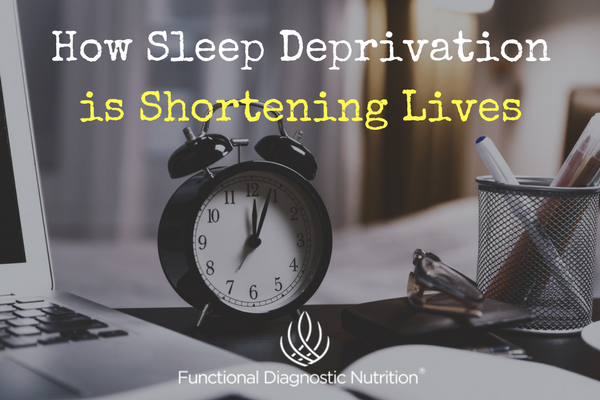Are your clients getting enough sleep regularly? Many likely are not. There is a constant pull for people to be productive and to make the best use of their time. If you have a client that is feeling pressure to work more, achieve more or have more, for this to happen, something else must give.
Often sleep is the first thing to go
Many people view sleep as expendable. They willingly sacrifice sleep without giving it much thought. It is far easier to go to bed later or wake up earlier than to admit that there isn’t enough time to do it all. Some even brag about their ability to “burn the candle at both ends” as if it were a symbol of tenacity or strength.
This thinking is just plain wrong. Sleep is one of the keys to being healthy. It is not an option because without it, the body will die. The truth is 99% of the time, when people claim to require “less sleep than the average person,” they’re lying – to you and themselves – whether they realize it or not.
The glorification of sleep deprivation
There are a handful of successful celebrities and business leaders dubbed “the sleep elite” who habitually sleep less than 6 hours a night. They proudly attribute some level of their success to their reduced time between the sheets.
Former president Barack Obama slept less than 5 hours or less a night while in the White House, due to the demands of running the country. Martha Stewart is known to get only 4 hours of sleep nightly to stay on top of her empire.
President Donald Trump claims that his ability to operate on a mere 3 hours of sleep gives him the competitive advantage necessary for success in the boardroom and in the Oval Office. Perhaps the most ironic example is Thomas Edison, who regarded sleep as useless, “heritage from our cave days” and only indulged in 3-4 hours per night.
While they’ve all accomplished great things, the decision to forgo sleep carries a price – even for the elite. That price is health and longevity. While there seems to be a tendency in our culture to applaud the ability to function without sleep, the value of sleep is quite arguably comparable to anything that money can buy.
The challenge is to change your client’s mindset. Sleep should be valued and even coveted, not considered an option.
How lack of sleep damages health and shortens lives
In the short term, not getting enough quality sleep can affect judgment, mood, and the ability to learn and retain information. It also increases the risk of serious accidents and injury. However, the bigger, lesser known danger is the cumulative effect of chronic sleep deprivation. Giving up sleep can contribute to chronic health problems including obesity, diabetes, autoimmune disease, cardiovascular disease, digestive issues, and early death.
The purpose of sleep
Sleeping is a productive activity, not an inactive one. Each day, the brain takes in thousands of new bits of information. Consciously and subconsciously, the brain gathers data, learns new skills, and forms memories. When your client goes to sleep, their brain goes into organization mode, sorting, filing or discarding new data for easy access. If this clean-up process is not allowed to occur, the disorganized brain becomes polluted with information and cellular clutter. This clutter leads to dysfunction in the brain, which typically manifests in the body as health issues such as immune function decline, increased cortisol levels, hormonal imbalances, blood sugar regulation issues, weight gain, and inflammation.
During proper sleep, growth hormone and testosterone levels increase. Each plays a crucial role in muscle repair and neural growth. In addition to muscle repair and recovery, sleeping allows for restoration of the adrenal glands, liver detoxification, and the rebuilding of the immune system. When your client doesn’t sleep enough, their body is in a continuous, hormonally depleted catabolic state. In other words, the body begins to break down, and sleep is needed to build it back up.
Prolonged sleep deprivation can lead to digestion and absorption issues resulting in malnutrition, adrenal fatigue, and malfunctions of the autonomic nervous system, including irregular heart-beat and compromised kidney and liver function. As a result, chronic pain, inflammation, headaches, trouble concentrating, weight gain, low libido, and mood swings are considered “normal” in our sleep deprived society.
How Much Sleep Does Your Client Need?
Most adults will want to aim for 7-9 hours of sleep, but the exact number varies from person to person. Those recovering from an injury or illness, or under a great deal of physical or mental stress, might require slightly more. In general, sleeping fewer than 7 hours per night is associated with decreased alertness and increased risk for chronic disease. The more stress your client has and the more work their body does increases their need for sleep.
The Internal Body Clock
A system of biological clocks controls the daily, or circadian, rhythms of the body. Circadian rhythms determine sleep patterns, energy levels throughout the day, and influence hormone production, hunger, cell regeneration, and body temperature. In the most balanced state, circadian rhythm is in tune with nature. This creates a situation where the body is ready to wake and start the day at sunrise, is energized throughout the day, and then winds down as the sun sets while readying the body for a night of sleep and rejuvenation.
The “master” circadian clock that regulates the body’s daily cycle is found in a region called the suprachiasmatic nuclei (SCN) in the hypothalamus of the brain. The SCN sends signals throughout the body in response to dark and light. For example, after sunset, there is less light, and the SCN directs the pineal gland in the brain to produce more melatonin, the hormone which, among other things, makes a person sleepy.
Modern day electrical lighting significantly betrays the body’s inner clock by disrupting its natural rhythms. Each time light passes through the optic nerve to the SCN, it triggers a response. This light tells the brain to wake up and be alert, even in the evening when the body should be winding down.
Test, test, test!
There could be underlying dysfunctions hindering your client’s ability to sleep soundly. Some possible causes might be parasite or fungal infections, bacterial overgrowth, digestive issues, hormonal imbalances, inflammation, and/or chronic pain. It is important to see where in the body dysfunction is occurring so that you know where to focus healing.
A simple saliva test can determine their current circadian rhythm and cortisol pattern, steroid hormone balance, melatonin levels, and give some clues as to what might be preventing them from getting the sleep they’ve been dreaming of. Testing is always the first line of defense so that you stop the pattern of trial and error…and help your client get results, and start sleeping better again!
Optimize your client’s sleep
The good news is there are many natural techniques you can teach your clients to restore “sleep health.”
The sunlight factor
Between the hours of 6 -8 am, cortisol is at its highest. This surge of morning cortisol is what turns on the brain and body. It also coincides with the release of a very important hormone that is fittingly called VIP (Vasoactive Intestinal Polypeptide). VIP triggers a variety of important wake-up actions such as increased contractility in the heart, vasodilation (widening of the blood vessels), and liver glycogenolysis.
Morning sunlight exposure can maximize the waking effect of this cortisol release, helping to reset the circadian rhythm, naturally influencing cortisol levels to decline as the day progresses.
The importance of exercise
Getting some physical activity in the morning when energy levels tend to be higher is a great idea. Your client will enjoy improved ability to focus and handle stress during the workday and will sleep better at night.
Eating for metabolic type
In the morning, ghrelin, a hunger hormone which stimulates appetite, should be at its peak. It is very important for your client to listen to their body’s cues in to keep hunger and satiety hormones in balance. Doing so will also help to reset their circadian clock and begin to get their hormones in rhythm. Although some feel better when they wait to eat until later in the day, for many, skipping breakfast can further throw off the cycle, manifesting in cravings and increased appetite throughout the day. Be sure that your client chooses foods that are right for their metabolic type, as this will also help their body to maintain balance and reduce stress levels.
Limiting caffeine
To avoid sleep disruption, have your client restrict their caffeine consumption primarily to the morning hours, and taper caffeine as the day progresses. Emphasize avoiding over-sized caffeinated drinks, which contain unhealthy levels of caffeine. Limiting morning coffee to 2 conservative 8 oz. servings is ideal.
Dinner Before Dark
Eating a metabolically balanced meal before 7pm will keep your client satiated until bedtime. After sunset, a hormone called leptin is released from the body’s fat stores. Leptin is the opposite of ghrelin; instead of stimulating appetite, it promotes feelings of satiety. If your client’s circadian rhythm is working properly and leptin can do its job, this hormone can shut down appetite and control any late-night food cravings. An imbalance in these hormones can result in excessive eating, uncontrollable hunger, and improper sleep, leading to a vicious cycle of late night food cravings.
Create a night-time ritual
Have your client start winding down about 1-2 hours before bed. Encourage them to spend some time journaling or creating a to-do list for the next day. This will allow for a clear mind while drifting off to sleep. Have them shut off the television and power down computers, cell phones and other electronics. They can take a warm bath is that is something they enjoy. Upon exiting the bath, their body temperature will begin to slowly decrease, creating a perfect scenario to fall asleep. Encourage them to wear comfortable, loose fitting pajamas, dim the lights, and curl up on the couch with a bedtime story. Have them choose something that will help quiet the mind. Steer clear of books that relate to job, mysteries, or anything too exciting which could be stimulating. And make sure they read from an old-fashioned book with ink on paper and not screens.
Unplug
Ideally, the bedroom should be for two things. Both are primal human needs, both start with the letter “S,” and neither requires a cell phone, laptop, tablet, or TV. The bedroom is simply reserved for sleeping and sex. The television should be kept in the living room, and cell phones, tablets, and laptops should be kept and charged out of the bedroom, as well. The lights and noises from these devices stimulate the brain and compromise sleep.
Lights Out
Light suppresses melatonin production. The darker the room, the easier it will be for the body to fall asleep. Even in the middle of the night, light can seep in from street lighting or a full moon. Encourage your client to consider investing in some good curtains, blackout shades, or indoor blinds that don’t let any light in.
Keep it Cool
Studies have found that, in general, the optimal temperature for sleep is quite cool, around 60 to 68 degrees Fahrenheit. Temperatures that fall too far below or above this range can lead to restlessness and prevent optimal sleep.
Remember, missing out on sleep is aging you’re their body more quickly and hurting their health. So it’s important to act right away to ensure sweet dreams in your client’s future.







